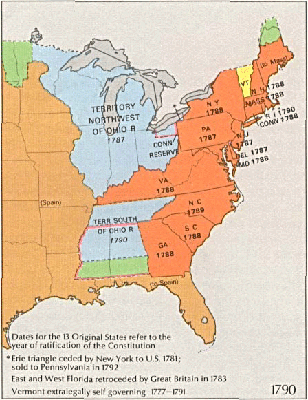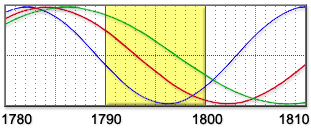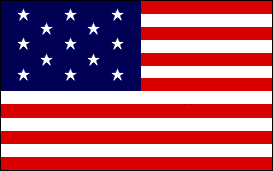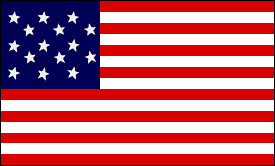Years in This Page:

|
|
|
|
This Overview is a brief look at the time and the influence of Cycles. Significant events from each year are noted along with the position of the Cycles to show how history is moving in Rhythm. Enjoy the walk through history.
See the go to Timelines here link near the top for a detailed look at Cycles for this decade.
See the Matrix links above left for navigating through all Overviews and Timelines by Time, Subject, or Cycle as described in Introduction to Part II.
click to enlarge
 |
The overall energy of the 1790s more Low than High. The Physical Cycle had a Downward Crossover in 1789 which led to 3rd Qtr. Reform for much of 1790s. After a trough in 1976 the Cycle rose through the 4th Qtr. which brought a search for alternatives. The Emotional Cycle was High until a Downward Crossover in 1793 brought trouble to the Federal government and executive officials. The Cycle then progressed through its 3rd Qtr. bringing more reforms into the next decade. The Intellectual Cycle was High and in the 2nd Quarter for much of the decade and we made advanced in commerce, invention and education. The Intellectual Downward Crossover in 1797 came as we had an international crisis with France which brought us to the brink of war.
Congress maintained the armed forces in the post-war period and authorized the establishment of the Navy in 1794 and the Marine Corps in 1794. But Washington had declared U.S. neutrality in the war between the British and French War in 1793and the Neutrality Act forbade involvement in foreign militias. Vermont became the 14th state in 1791, Kentucky became the 15th in 1792 and in 1796 Tennessee became the 16th. Congress established the Mississippi Territory in 1798 where fighting continued with Indians and the Spanish who controlled the Gulf ports. In Washington, the cornerstone was laid for the President's Palace in 1792 which later became known as the White House. The cornerstone for the U.S. Capitol was laid in 1793. George Washington and John Adams were reelected President and vice-President in 1793, then Federalist John Adams was elected president in 1796 with Thomas Jefferson (a Democratic-Republican) as vice-President. Fighting continued as Indians armed by the British attacked settlements in the Northwest Territory. The U.S. Militia put down Whiskey Rebellion in 1794 in Pennsylvania. |
top
| |
March 21, 1790 - |
| |
March 21, 1791 |
|
|
1790: States Reduced Capital Punishment and Congress Ended Debtor Imprisonment during the Physical Low of the 1790s. The Roman Catholic Episcopate was established in the Emotional High and Mathew Carey published the first Roman Catholic Bible in the United States. America's First Cotton Mill Improves Production with New Spindle Mill Machinery in this Intellectual 2nd Qtr. of Improvements and Printing Began on Dobson's Encyclopaedia. The Society for Alleviating the Miseries of Public Prisons was headed by Tenche Coxe, William Howard and Dr. Benjamin Rush as 1790 was in a Physical 3rd Qtr. of Reform - Emotional High. |
top
| |
March 21, 1791 - |
| |
March 21, 1792 |
|
|
1791: Bill of Rights ratified by Congress on December 15, 1791 created the first ten amendments to the Constitution and gave us our first major reform during Physical 3rd Qtr. of Reform. The Bank of United States formed a decade after the Bank of North America opened, then it opened branches in 1792 during the Intellectual 2nd Qtr. of Improvement. "The Rights of Man" by Thomas Paine in January of 1792 harshly attacked the monarchy and supported democracy in the Physical 3rd Qtr. - Emotional High. |
top
| |
March 21, 1792 - |
| |
March 21, 1793 |
|
|
1792: The New Exhibition Room opened in Boston in 1792 where plays were presented under the guise of "moral lectures." in the Emotional High. Established the national mint and mandated a decimal system, and The New York Stock Exchange was Organized in the Intellectual 2nd Qtr. of Improvements. The Democratic-Republican Party Formed in Variance to Centralized Federalists during the Emo-Intellectual Double 2nd Qtr. of Improvement. Virginia's Opposition to Slavery was led by statesman George Mason during the Physical 3rd Qtr. - Emotional High and Barlow Defended Human Rights Over Property Rights as he wrote "Advice to the Privileged Orders." |
top
| |
March 21, 1793 - |
| |
March 21, 1794 |
|
|
1793: Washington declared U.S. neutrality between the British and French War having no reason to intervene in this Physical Low. An Official Inquiry into the Condition of the Treasury came on January 23, 1793 after repeated but unsubstantiated charges of corruption and mismanagement against Treasury Secretary, Alexander Hamilton, on his conduct. in the Physical 3rd Qtr. Reform. Thomas Jefferson Resigned as Secretary of State and became the first leader of the anti-federalist Democratic-Republican Party. in this Emotional Downward Crossover. Also in this Crossover, A Slave Rebellion in Albany, New York broke out and slaves set a series of devastating fires in the city. And, Albert Gallatin was Barred From his Elected Seat on February 28, 1794 by Federalists who opposed his stand against the whisky tax. Eli Whitney Invented the Cotton Gin in 1793 in the Intellectual 2nd Qtr. Improvements. |
top
| |
March 21, 1794 - |
| |
March 21, 1795 |
|
|
1794: Congress Passed the Neutrality Act on June 4, 1794 which reinforced President Washington's neutrality proclamation by forbidding American citizens from joining the military service of foreign powers and banning the provisions and fitting of armed vessels from foreign power in American ports in this Physical Low. Congress Passed a Bill Banning Slave Trade with Foreign Nations in this Physical Low. The Use of Powder on Men's Hair Went Out of Fashion as style became less flamboyant in the Emotional Low. Opera Advanced in 1790's. America's first orchestral score and first opera house appeared in 1791, and James Hewitt wrote "Tammany or the Indian Chief," one of America's first operas in 1794 during the Intellectual High.
Paine published the first part of "The Age of Reason," in 1794 and it became popular with all who resented religious and political tyranny in 1794 and it became popular with all who resented religious and political tyranny in the Emotional 3rd Qtr. Reform - Intellectual High. |
top
| |
March 21, 1795 - |
| |
March 21, 1796 |
|
|
1795: The Implementation of Interchangeable Parts in Industry proved to be one of the most significant improvements to manufacturing in the Intellectual High of this year. Both Simeon North Eli Whitney are credited with developing this. Secretary of State Edmund Randolph Resigned from his Post under Suspicion of Corruption during the Physo-Emotional Dbl. 3rd Qtr. Reform. |
top
| |
March 21, 1796 - |
| |
March 21, 1797 |
|
|
1796: In our first Physical 4th Quarter of Alternatives, Washington Refused the Presidency for a Third Term. He also warned the United States against involvement in foreign affairs in his "Farewell Address" as America took on fewer fights in the Physical Low. Robert Fulton Wrote the "Treatise on the Improvement of Canal Navigation" discovering better ways to travel in the Intellectual High. Federalist's "Reason" Defeated Republican "Idealism" with the election of Adam in the 1796 Presidential election that came during a Emotional Low - Intellecutal High. |
top
| |
March 21, 1797 - |
| |
March 21, 1798 |
|
|
1797: The Treaty with Tripoli reflected America's quest for peace over fighting in the Physical Low. The Great Revival began on the frontier 1797 with the preaching of James McGready whose camp-meeting movement climaxed with the Cane Ridge Meeting in August of 1801. The revival brought the return of traditional religion during the Emotional 3rd Qtr. Review. The XYZ Affair resulted as France interfered with U.S. shipping. Three agents of Charles Maurice de Talleyrand attempt to extort money from U.S. commissioners in Paris. Three agents were set to France by President Adams to negotiate but Talleyrand refused to deal with them directly and sent three agents to meet them instead. These agents, who were referred to as X, Y, and Z in reports of the American delegation attempted to extort money. Pinckney is believed to have said, "Million for defense, but not one cent for tribute." conceptual conflict precipitated an undeclared naval war between the U.S. and France from 1798 to 1800. While this conflict could have occurred at any time, in may have been exacerbated by the crisis of and Intellectual Downward Crossover. President Adams went on to avoided war with France by reopening negotiations in Physical Low of 1799. Also during this Crossover, The U.S. House of Representatives Voted to Impeach Senator William Blount from Tennessee for conspiracy to instigate war with Spain. The Senate expelled Blount but charges against him were dismissed in 1799. As came the 11th Amendment Limited Federal Jurisdiction Over States after ratification by the Senate on January 8, 1798, showing early reform on our legal system in the Intellectual 3rd Qtr. Reform. |
top
| |
March 21, 1798 - |
| |
March 21, 1799 |
|
|
1798: Americans solved issues of speed and mass production. Eli Whitney secured a US government contract to produce 10,000 army muskets then went on to refine and implement "Uniformity-System" of production with inter-changeable parts. This bit of "Yankee ingenuity" came in the Intellectual High. Imprisonment of Debtors was Abolished as enforcement lessend in the Physical Low - Emotional 3rd Qtr. Reform and the Alien and Sedition Acts Were Declared Unconstitutional. |
top
| |
March 21, 1799 - |
| |
March 21, 1790 |
|
|
1799: Adams avoided War with France in the Physical Low by reopening negotiations and seeking peace over fighting. The death of George Washington brought about national morning and writers immediately began to portray him as a hero of almost mythological proportions in the Emo-Intellectual Dbl. 3rd Qtr. of Review. |
|
|


 Kala. Chart horizontal
Kala. Chart horizontal

 for decade
for decade



